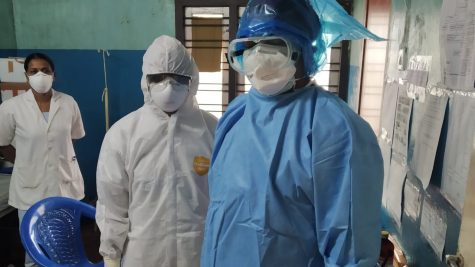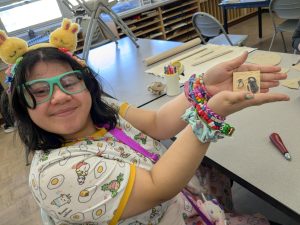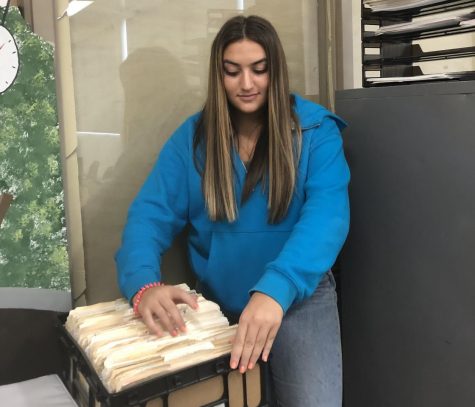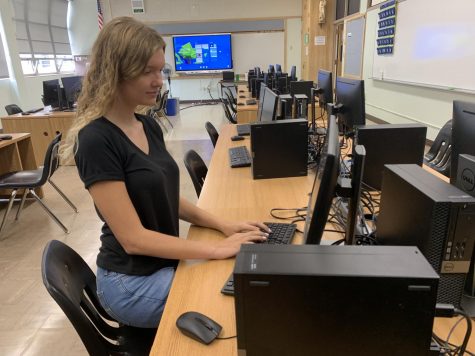Health Care Crisis Brings Life Changes
May 3, 2020
The coronavirus (COVID-19) has made a large impact on every person in the community very differently.
Health care and medical care have been hugely impacted in many ways. The overflowing amount of patients that have been infected with this virus is causing a stress in the medical community.
With this highly contagious virus, many nurses, doctors, and other health care professionals are putting their lives on the line to be able to help those in need; however, it has been difficult for these professionals to do their jobs when there’s a shortage of resources. There is an overall shortage of protective equipment that includes masks, gloves, gowns, and protective eye gear. There is also a shortage of space and hospital beds throughout our country and even in our own state. Many people throughout our community and country have stepped up to try to help the problem of the shortage of resources.
There is a lot of time on people’s hands due to the “Stay at Home Law” being enforced to protect this virus from spreading. Many people are using this time for good.
Sheila and Greg Cotingham, a member of our community, have specifically made many masks to donate to those who need them. They have also been making protective shields from a 3D printer. These masks will be used in hospitals and EMT’s that need them to protect themselves from this contagious disease.
Many of the states in the United States are worried about ventilators that help patients due to this upper respiratory virus.
Doctors are having to make difficult decisions to determine who receives a ventilator. There is a system put in place to determine who gets the ventilators due to the shortage. These decisions are life or death for some patients relying on these ventilators to survive, which makes health care professionals decisions ever harder.
According to KOMO news, the system that determines who receives ventilators is based on a points system which figures in the patient’s expectancy of survival, their age, and who would be benefitted the most. The doctors are put into very tough positions when declining patients due to the lack of resources.
Many nurses throughout our country have been affected by the Corona Virus in different ways. Here, in Seattle, nurse Jeanne Kaimakis has taken the steps to prevent her and her husband from catching the virus.
After 37 years of being a nurse, she has decided to retire for now. Jeanne and her husband Bill will be turning 80 and 90 in the fall. Due to their ages, she is forced into retirement, because catching the virus could be fatal,
“I have chosen since day one to stay home for Bill,” said Kaimakis. “Even after 57 years of marriage, I would do anything to protect his health.”
At the beginning of this crisis, Kaimakis worked at her job, dedicated to helping her patients. But after some tough decisions, she knows by taking a step back it will keep her husband safe.
Kaimakis has been working at the nursing home Mirabella for around 10 years. She has worked as a hospice nurse, resident care manager, a dementia/ Alzheimer’s nurse and more. She mentions how after 10 years of working there, she will miss the connection she has made with her fellow staff and residents. She still communicates to workers via text messages. She says they say life is very stressful during this time and how they are taking extreme measurements to not put the residents in danger. The nurses also mention how they are in need of supplies and workers. Even though Jeanne wants to help, her hands are tied because of safety.
Jeanne is still not ready for retirement life. She says how much she loves working and cannot imagine life without it,
“I felt healthier working,” she said. “The mandated quarantine forcing me to stay home has stressed me out mentally and physically.”
She spends most of her days cleaning, cooking, caring for Bill, gardening, and listening to music. She hopes for a vaccine but does not see it in the near future. She believes it will take a year for this mayhem to blow over. With that, sadly, she realizes this might be the end of her career.
She wants to share some important tips and tricks on staying healthy,
“My biggest advice is to eat well, get a good night’s sleep, and stay in,” said Kaimakis.
Furthermore, she emphasizes the importance of gratitude,
“Appreciate the little things in life, the coffee stands, restaurants, the walks. Hopefully, this changes our outlook on things,” said Kaimakis.
Jeanne Kaimakis is a beacon to what nurses should aspire to be. Because of her dedication and selflessness, she is an inspiration to all.
The crisis, however, has changed the very method patients seek treatment.

Healthcare workers wearing personal protective equipment while caring for patients with coronavirus infection at the Tirur District Hospital in the Indian state of Kerala.
Many doctor visits are now being done over the phone or on Zoom, non-emergency procedures are being postponed, people are cancelling doctors appointments left and right to stay safe. But you can’t exactly do an ultrasound on video chat and you can’t postpone chemotherapy or cancel a double bypass surgery.
Cancer treatments and labor and delivery can’t be postponed until after the quarantine, but how do these procedures that often involve the most vulnerable demographic of immune-compromised people carry on when hospitals are being seen as a war zone.
Doctors and other health care professionals don’t have answers for some of these tough questions that are being asked because they have no idea either, which combined with often exaggerated media reports leads to a fearful and panic driven society.
People are mainly turning to message boards online to get their questions answered which can lead to even more misinformation.
Many terminal patients are avoiding routine monthly blood draws to monitor their conditions simply because they don’t want to take the chance of coming in contact with the virus. People are having to weigh the risks of either not getting necessary medical help or coming in contact with a virus that would mean death for them.
Precautions are being taken to avoid the virus spreading throughout crowded hospitals. People experiencing Covid-19 symptoms are being told to call the hospital ahead of time so the doctors and staff members can prepare for their arrival. These patients are then welcomed by people in protective gear and then taken through a seperate entrance than other patients.
Maternity wards are one of the biggest areas of a hospital where changes are being implemented. In places like New York, where the disease rate is especially high, new moms are not allowed any guests during labor and delivery, making them undergo the experience alone.
In other places the only visitors allowed are the women’s partner and their parents. Doula services are now being done via video conferencing. Many women are exploring the idea of a home birth, but medical professionals are wary of this and stand by the fact that giving birth in a hospital is the safest way to go even in uncertain times.
The only certainty in the whole Covid-19 pandemic is adaptation. We have for the last six weeks had to adapt to our “new normal.”
The question we all must consider is will we ever return to our formal normal.
Wise people realize that is an impossibility; we have had to change too much to cope with the dangers we still face.
We will adapt to our future, but we would be wise to bring the lessons we have learned in this experience with us.







